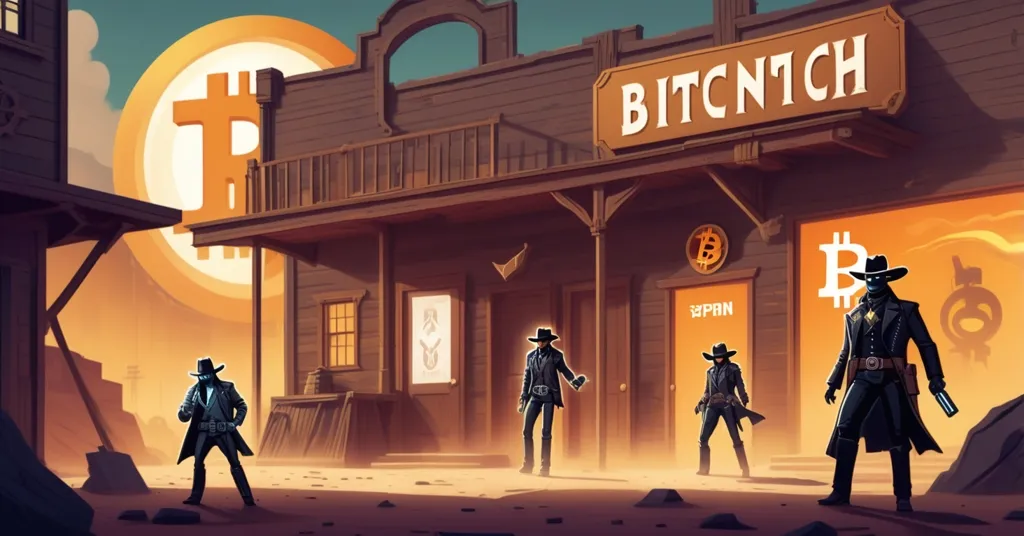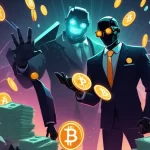Bitcoin Scams, XRP ETF Launch, and DeepSnitch AI: Crypto’s Wild Frontier Uncovered

Bitcoin Scams, XRP ETF Breakthrough, and DeepSnitch AI: Crypto’s Rough-and-Tumble Frontier
The cryptocurrency world is a high-stakes battleground where jaw-dropping scams, like the UK’s record seizure of 61,000 Bitcoin, clash with monumental strides toward mainstream acceptance, such as the first XRP spot ETF launching on Nasdaq. Meanwhile, projects like DeepSnitch AI, a presale raising over $500,000 with promises of AI-driven trading tools, tempt investors in a landscape where separating gold from fool’s pyrite is no easy task.
- Massive Crypto Fraud: UK confiscates 61,000 BTC in historic bust; Zhimin Qian jailed for defrauding 128,000 victims.
- Mainstream Milestones: XRP ETF debuts on Nasdaq; Solana ETFs draw $369 million despite price drops.
- DeepSnitch AI Hype: Presale hits $500K with AI tools for traders, but unproven projects demand caution.
Crypto’s Dark Underbelly: Record-Breaking Scams
Let’s kick off with the grim reality that keeps many on edge in this space: crypto scams are not just a nuisance, they’re a full-blown epidemic. In the UK, authorities recently pulled off their largest cryptocurrency seizure ever, confiscating 61,000 Bitcoin—worth billions at today’s prices—in connection with a sprawling fraud scheme. At the center of this debacle is Zhimin Qian, a Chinese fugitive who masterminded a multi-billion-dollar scam that shattered the lives of over 128,000 victims. Many lost their life savings and pensions to her elaborate network of fake investment platforms that promised outsized returns but delivered only despair. During her sentencing to over 11 years in prison, Judge Sally-Ann Hales laid it bare:
Your motive was one of pure greed.
This case isn’t an outlier; it’s a glaring symptom of a broader disease. According to reports from blockchain analytics firm Chainalysis, crypto fraud losses hit $5.9 billion globally in 2022, and 2023 numbers suggest the trend isn’t slowing. Scammers are getting craftier, leveraging AI to mimic human interaction and deploying tactics like “pig butchering”—a chilling term for schemes where fraudsters build trust over weeks or months, often through social platforms like WhatsApp or Facebook, before draining victims’ wallets. In one reported case, an individual lost $280,000 after falling for such a ploy. Then there are impersonation scams, with Australian police recently warning of criminals posing as law enforcement to trick crypto holders into transferring funds. For those new to this, these scams exploit trust and FOMO (fear of missing out), preying on both naivety and greed. It’s a brutal reminder that in crypto, if someone’s overly eager to “help” you invest, they’re likely helping themselves to your money.
But let’s not pretend law enforcement is sitting idle. The UK’s massive Bitcoin haul shows that authorities are stepping up, using blockchain’s transparency to trace illicit funds—something impossible with traditional cash. Yet, here’s the rub: for every Qian behind bars, ten more scammers are spinning up new schemes, often faster than regulators can react. The fight against crypto crime is a game of whack-a-mole with billion-dollar stakes, and while these busts are victories, they’re drops in a very leaky bucket.
Mainstream Momentum: XRP and Solana ETFs Signal Shift
While fraud casts a long shadow, there’s a brighter side to crypto that’s hard to ignore—traditional finance is starting to saddle up. On November 13, Canary Capital made waves by launching the first spot XRP ETF on Nasdaq under the ticker XRPC. For the uninitiated, an ETF, or exchange-traded fund, is like a basket of investments you can buy into through a regular brokerage account, sidestepping the hassle of directly owning and securing cryptocurrency. This debut is a landmark for XRP, the native token of the Ripple network often used for cross-border payments, as it signals growing institutional trust. What’s more, regulatory clarity is improving—there’s buzz that XRP could be classified as a commodity under the US Commodity Futures Trading Commission (CFTC), rather than a security under the Securities and Exchange Commission (SEC), which has long hounded Ripple with lawsuits over centralized issuance concerns. A commodity status would slash legal uncertainty, making XRP more palatable to big money and potentially setting a precedent for other altcoins.
Still, let’s pump the brakes on the hype. While ETFs are a step toward mainstream adoption, they also risk diluting crypto’s core ethos of decentralization. Handing over exposure to centralized funds could mean more control in the hands of suits, not coders or cypherpunks. And from a Bitcoin maximalist lens—where I often lean—XRP’s utility is narrow compared to Bitcoin’s unassailable role as a decentralized store of value. Altcoins like XRP might shine in specific niches, but they carry heavier regulatory baggage and technical risks. This ETF is progress, no doubt, but it’s not the holy grail.
Elsewhere, Solana, a blockchain known for lightning-fast transactions and often billed as an Ethereum rival, is also catching institutional eyes. Solana ETFs have raked in $369 million since their launch, with Bitwise’s BSOL fund leading at $344.3 million and Grayscale’s GSOL pulling $24.4 million despite steeper fees. This inflow persists even as SOL’s price slipped 4.9% to $153, dragged down by a massive token unlock from Alameda Research—the ghost of FTX’s collapse still haunting markets. For clarity, a token unlock means previously restricted coins become tradeable, often flooding supply and tanking prices as early holders sell off. In this case, 193,000 SOL worth $30 million hit the market, spooking short-term traders.
So why the big bets on Solana? Institutions see it as a future-proof platform for decentralized applications (dApps), from NFT marketplaces to DeFi protocols, thanks to its low-cost, high-speed transactions—think cents and seconds versus Ethereum’s dollars and minutes in peak congestion. Yet, Solana isn’t bulletproof; it’s had network outages in the past, and its price volatility shows it’s no safe haven. Bitcoin purists might scoff here too—SOL’s tech is slick, but it’s not the battle-tested, censorship-resistant fortress that Bitcoin offers. Institutional money is a vote of confidence, but it doesn’t guarantee smooth sailing.
DeepSnitch AI: Innovation or Another Mirage?
Now, let’s zoom in on a project stirring up chatter in the retail space: DeepSnitch AI. This presale venture has pulled in over $500,000, with tokens priced at $0.02289 during its Stage 2 round—a 50% bump from the initial $0.0151. If you’re new to the game, a presale is an early funding stage where investors buy tokens at a discount before they’re listed on public exchanges, banking on future gains (or, let’s be real, bracing for a total wipeout if it flops). DeepSnitch markets itself as a lifeline for retail traders, offering five specialized AI agents for crypto surveillance. Picture tools that might track whale wallet movements to predict dumps or scan social media for sentiment shifts—essentially aiming to level a playing field where small fish often get eaten by sharks. Their tokenomics appear upfront, with 35% of tokens for the presale, 30% for marketing, and the rest split across development and liquidity pools. The public presale wraps by January 31, 2026, or sooner if the fundraising cap is hit, and tokens can be bought on their official site with ETH, BNB, USDT, USDC, or credit cards. For more details on DeepSnitch AI’s presale and legitimacy checks, there are resources available to guide potential investors.
At first glance, DeepSnitch AI seems to stand out in a sea of dubious projects. An active community and a focus on practical utility contrast with the endless parade of rug pulls—scams where developers vanish with investor funds after hyping a worthless token. The hunger for AI-driven crypto tools is real; retail traders are desperate for an edge in a market rigged by insider knowledge and bots. But hold your horses—presales are a minefield, and DeepSnitch is unproven. No exchange listings are confirmed, which could mean liquidity issues down the line. The team’s credentials and tech audits need scrutiny; hype doesn’t equal delivery. And let’s be brutally honest: can AI really democratize trading when the biggest players often manipulate markets with raw capital, not algorithms? I’m skeptical. As for price predictions floating around, I’ll say it loud and clear—anyone claiming to know where a presale token is headed is either clueless or straight-up shilling. If you’re eyeing DeepSnitch, focus on the tech’s potential, not some pipe dream of overnight riches.
Key Takeaways: Burning Questions in Crypto Today
- How are crypto scams becoming more dangerous?
They’re evolving with AI-driven deception and tactics like pig butchering, where scammers build trust before striking. Cases like Zhimin Qian’s multi-billion-dollar fraud, impacting 128,000 victims, show the devastating scale. - What’s the significance of the UK’s 61,000 Bitcoin seizure?
It’s a historic win for law enforcement, exposing the reach of crypto fraud while proving blockchain tracing can recover illicit funds—though it won’t stop the next wave of criminals. - Why does the XRP ETF on Nasdaq matter?
It’s a major nod to institutional adoption, easing regulatory fears around XRP and hinting at broader acceptance of altcoins in traditional finance. - What fuels Solana ETF inflows despite price dips?
Big investors bet on Solana’s scalability for dApps and DeFi, looking past short-term volatility from token unlocks to its long-term tech promise. - Is DeepSnitch AI a safe bet or another presale risk?
Transparency and utility suggest potential, but it’s untested—lack of exchange listings and unverified tech are red flags in a scam-heavy space. - How does Bitcoin stack up against altcoin developments?
Bitcoin remains the gold standard for decentralization and security, while altcoins like XRP and Solana innovate in niches but face greater regulatory and technical uncertainties. - How can crypto enthusiasts protect themselves from fraud?
Prioritize project fundamentals, verify team credibility, and distrust unrealistic promises. Knowledge and skepticism are your best shields.
Crypto is a beast of contradictions— a frontier where revolutionary tools for freedom and finance coexist with outlaws ready to fleece the unwary. The UK’s Bitcoin bust and Qian’s downfall are stark warnings to stay vigilant, while breakthroughs like the XRP ETF and Solana’s institutional backing fuel hope for a maturing industry. DeepSnitch AI could be a diamond in the rough or just another mirage; only time and due diligence will tell. As we look to 2024, one question looms large: will crypto finally tame its bandits, or are we destined for more billion-dollar heists? Knowledge is power in this game—stay sharp, question everything, and ride out the storm.



